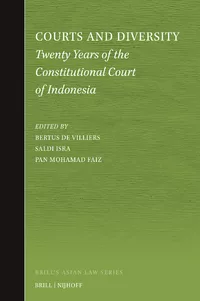Yance Arizona et Miriam Cohen, « The Recognition of Customary Land Rights at the Constitutional Court of Indonesia: A Comparative and International Law Assessment », dans Courts and Diversity: Twenty Years of the Constitutional Court of Indonesia, Bertus (dir.), pages 173-194, 2024, Brill
Extrait en anglais:
This chapter analyzes the legal recognition of indigenous peoples’ rights in Indonesia through a comparative and international law framework. The focus is on landmark cases from the Constitutional Court of Indonesia, which has had a significant role in defining the contours of indigenous peoples’ rights within the country. The chapter discusses the development of jurisprudence concerning customary land rights and the impact of international law on indigenous rights in Indonesia. The examination includes the legal frameworks that protect indigenous peoples’ rights internationally, including the International Covenant on Civil and Political Rights (ICCPR), the International Labor Organization Convention 169, and the United Nations Declaration on the Rights of Indigenous Peoples. In Indonesia, indigenous organizations have been advocating for a special law on indigenous peoples’ rights since 2011. However, political support for such legislation has been lacking in Parliament. Through the analysis of landmark decisions, it becomes apparent that judicial rulings have a significant impact on the development of indigenous rights. The Constitutional Court of Indonesia has confirmed the need for a special law regarding indigenous peoples, but until such legislation is enacted, scattered laws in various sectoral areas, such as mining, forestry, and coastal fields, can be justified. The chapter concludes that international law has had a positive impact on the development of the Court’s jurisprudence and the recognition of customary land rights within Indonesia. The Court’s rulings have been inspired by international environmental law and the UNDRIP, and the Court looks to international law to further protect the rights of indigenous peoples. The Court’s decisions have also generated legal reform and altered the concept of colonial law that is still inherent in national forestry law, strengthening the rights of indigenous peoples in Indonesia. Although the influence of landmark court decisions is still limited in Indonesia, the chapter finds that the Court’s decisions have played a significant role in recognizing the customary rights of indigenous peoples in the country.









